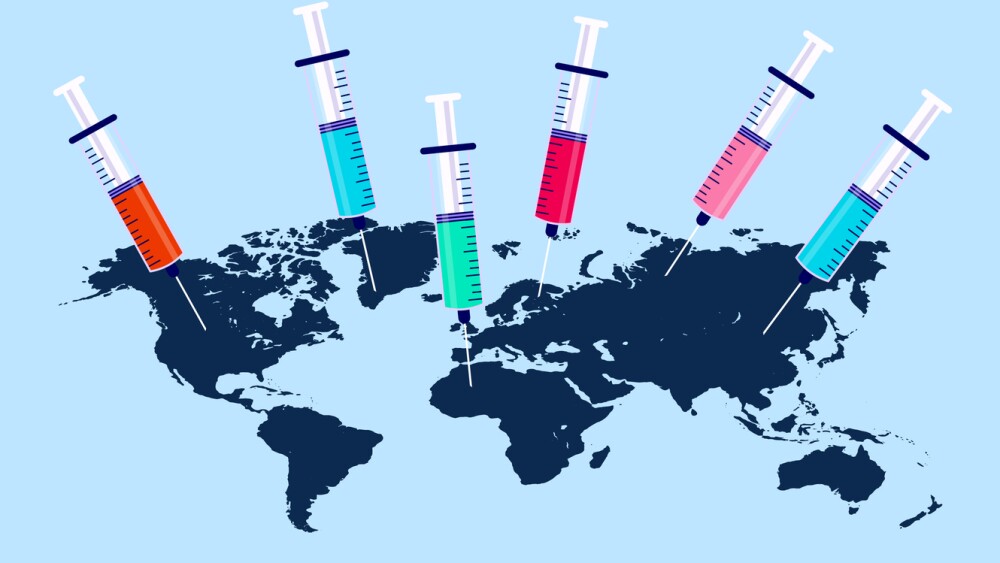ROCKVILLE, Md., Nov. 5 /PRNewswire-FirstCall/ -- Human Genome Sciences, Inc. today announced the final quality-of-life results from a Phase 2b clinical trial of the investigational drug, Albuferon(R) (albinterferon alfa-2b), in combination with ribavirin in treatment-naive patients with genotype 1 chronic hepatitis C. The study demonstrated that patients in the Albuferon treatment groups reported fewer missed days of work and less impairment of health-related quality of life on treatment compared to the Pegasys (peginterferon alfa-2a) group.
(Logo: http://www.newscom.com/cgi-bin/prnh/20010612/HGSLOGO )
The final Phase 2b quality-of-life results are being presented this week at the 58th AASLD Annual Meeting in Boston. In two additional press releases issued by HGS today, the Company announced the full presentations at AASLD of efficacy and safety data from the Phase 2b trial of Albuferon in treatment- naive patients, and results from the Phase 2 trial of Albuferon in combination with ribavirin in patients who did not respond to prior therapy.
"Patients undergoing treatment for chronic hepatitis C often find it challenging to go to work or participate in other normal daily activities, especially in the days following dose administration," said Stephen Pianko, M.D., F.R.A.C.P., Ph.D., Monash University, Melbourne, Australia. "The results of the Phase 2b trial suggest that Albuferon may have the potential to offer a therapeutic alternative with fewer lost days of work and less impairment of health-related quality of life on treatment, compared with peginterferon alfa-2a, with at least comparable efficacy and safety. We look forward to further evaluation of Albuferon's impact on patient quality of life in the ongoing Phase 3 trials."
In the open-label, multi-center, active-controlled Phase 2b trial, 458 treatment-naive patients with genotype 1 chronic hepatitis C were randomized to four treatment groups: Albuferon 900 mcg every two weeks, Albuferon 1200 mcg every two weeks, Albuferon 1200 mcg every four weeks, and peginterferon alfa-2a 180 mcg once a week. All patients received weight-based oral ribavirin daily. The trial included 48 weeks of treatment, and the primary efficacy endpoint was SVR, defined as undetectable viral load (HCV RNA<10 IU/mL) at 24 weeks following completion of treatment. Health-related quality of life was assessed using the Short Form 36 (SF-36) health survey. SF-36 is a validated patient-reported outcomes instrument, consisting of 36 questions used to measure the health status of patients with chronic hepatitis C. The 36 questions result in an 8-scale health profile including: physical function, physical role limitations, vitality, general health perceptions, pain, social function, emotional role limitations, and mental health. Summaries of the combined physical and mental component measures were also used in the assessment.
"Strongly positive overall quality-of-life results were observed for the Albuferon treatment groups, and they were strongest among patients receiving the Albuferon 900-mcg dose every two weeks," said David C. Stump, M.D., Executive Vice President, Research and Development, HGS. "This Albuferon treatment group achieved a statistically significant reduction in the number of missed work days compared with peginterferon alfa-2a, and also achieved statistically and clinically meaningful differences in many of the SF-36 quality-of-life domains."
Key Quality-of-Life Findings from the Phase 2b Study
Working patients in all Albuferon treatment groups recorded fewer days of missed work than was observed in the peginterferon alfa-2a treatment group. All Albuferon groups showed less impairment of health-related quality of life based on SF-36 physical and mental component summary scores.
Significantly fewer working patients taking Albuferon 900 mcg every two weeks reported missing 7 days or more of work during the month prior to their treatment visits at Weeks 12 and 24, vs. patients taking peginterferon alfa- 2a. At week 12, only 4.2% of patients taking Albuferon 900 mcg every two weeks had missed 7 or more days of work the previous month, compared with 18.1% of peginterferon alfa-2a patients (p<.05). At week 24, only 5.3% of Albuferon 900-mcg patients had missed 7 or more days of work the previous month, compared with 20.3% of peginterferon alfa-2a patients (p<.05). At Week 12, working patients taking Albuferon 900-mcg every two weeks reported missing an average of 1.1 days of work during the previous month, while peginterferon alfa-2a patients reported missing an average of 4.3 work days (p<.05). At Week 24, Albuferon 900-mcg patients had missed an average of 1.6 days of work during the previous month, while peginterferon alfa-2a patients had missed an average of 4.7 work days.
At Weeks 12 and 24, the treatment group taking Albuferon 900 mcg every two weeks also reported better scores for all eight SF-36 physical and mental health domains, as well as the physical and mental summary scores, compared with peginterferon alfa-2a. Statistically significant and clinically meaningful differences were observed in the mental health, bodily pain, vitality and social functioning domains. By the Week 12 follow-up visit after the end of treatment, changes in mental health as measured by the Hospital Anxiety and Depression Scale (HADS) had recovered to baseline in 67% of the patients taking Albuferon 900 mcg, compared with 57% of the peginterferon alfa-2a patients.
The treatment group taking Albuferon 1200 mcg every two weeks also recorded fewer lost days of work and less impairment of health-related quality of life on treatment than was reported for the peginterferon alfa-2a group.
About Albuferon
Albuferon is a novel long-acting form of interferon alpha created by HGS using its proprietary albumin fusion technology. Albuferon results from the genetic fusion of human albumin and interferon alpha. Human albumin is the most prevalent naturally occurring blood protein in the human circulatory system, persisting in circulation in the body for more than 20 days. Research shows that genetic fusion of therapeutic proteins to human albumin decreases clearance and prolongs the half-life of the proteins. Recombinant interferon alpha is approved for the treatment of hepatitis C, hepatitis B and a number of cancers.
Albuferon is being developed by HGS and Novartis for the treatment of chronic hepatitis C under a worldwide co-development and commercialization agreement entered into in June 2006. HGS and Novartis will co-commercialize Albuferon in the United States and will share clinical development costs, U.S. commercialization costs and U.S. profits equally. Novartis will be responsible for commercialization in the rest of the world and will pay HGS a royalty on those sales. Clinical development, commercial milestone and other payments to HGS could total as much as $507.5 million, including $132.5 million received to date.
About Hepatitis C
Hepatitis C is an inflammation of the liver caused by the hepatitis C virus (HCV). An estimated 170 million people worldwide are infected with the virus, including nearly 4 million people in the United States. When detectable levels of HCV persist in the blood for at least six months, a person is diagnosed with chronic hepatitis C. Hepatitis C virus can cause serious liver disease, leading to cirrhosis, primary liver cancer and even death.
About Human Genome Sciences
The mission of HGS is to apply great science and great medicine to bring innovative drugs to patients with unmet medical needs.
The HGS clinical development pipeline includes novel drugs to treat hepatitis C, lupus, anthrax disease, cancer and other immune-mediated diseases. The Company's primary focus is rapid progress toward the commercialization of its two key lead drugs, Albuferon for hepatitis C and LymphoStat-B(R) (belimumab) for lupus. Phase 3 clinical trials of both drugs are ongoing.
ABthrax(TM) (raxibacumab) is in late-stage development for the treatment of anthrax disease, and the Company is on track to begin the delivery in 2008 of 20,000 doses of ABthrax to the Strategic National Stockpile under a contract entered into with the U.S. Government in June 2006. Other HGS drugs in clinical development include two TRAIL receptor antibodies for the treatment of cancers.
For more information about HGS, please visit the Company's web site at www.hgsi.com. To view the AASLD oral presentation reporting results of the Phase 2b clinical trial of Albuferon in combination with ribavirin in treatment-naive patients (Zeuzem, et al), click here. To view the AASLD poster presentation reporting quality of life results from the Phase 2b clinical trial of Albuferon (Pianko, et al), click here. To view the AASLD oral presentation reporting results of the Phase 2 trial of Albuferon in non- responders (Nelson, et al), click here. To view the AASLD poster presentation reporting results of a prospective comparison of commercial fibrosis serum marker panels (Patel, et al), click here. For more information about Albuferon, please visit www.hgsi.com/products/albuferon.html. Health professionals or patients interested in Albuferon clinical trials or other studies involving HGS products may inquire via the "Contact Us" section of the Company's web site, www.hgsi.com/products/request.html, or by calling (301) 610-5790, extension 3550.
HGS, Human Genome Sciences, ABthrax, Albuferon and LymphoStat-B are trademarks of Human Genome Sciences, Inc.
Safe Harbor Statement
This announcement contains forward-looking statements within the meaning of Section 27A of the Securities Act of 1933, as amended, and Section 21E of the Securities Exchange Act of 1934, as amended. The forward-looking statements are based on Human Genome Sciences' current intent, belief and expectations. These statements are not guarantees of future performance and are subject to certain risks and uncertainties that are difficult to predict. Actual results may differ materially from these forward-looking statements because of the Company's unproven business model, its dependence on new technologies, the uncertainty and timing of clinical trials, the Company's ability to develop and commercialize products, its dependence on collaborators for services and revenue, its substantial indebtedness and lease obligations, its changing requirements and costs associated with facilities, intense competition, the uncertainty of patent and intellectual property protection, the Company's dependence on key management and key suppliers, the uncertainty of regulation of products, the impact of future alliances or transactions and other risks described in the Company's filings with the Securities and Exchange Commission. In addition, the Company will continue to face risks related to animal and human testing, to the manufacture of ABthrax and to FDA concurrence that ABthrax meets the requirements of the ABthrax contract. If the Company is unable to meet the product requirements associated with the ABthrax contract, the U.S. government will not be required to reimburse the Company for the costs incurred or to purchase any ABthrax doses. Existing and prospective investors are cautioned not to place undue reliance on these forward-looking statements, which speak only as of today's date. Human Genome Sciences undertakes no obligation to update or revise the information contained in this announcement whether as a result of new information, future events or circumstances or otherwise.
CONTACT: Jerry Parrott, Vice President, Corporate Communications,
+1-301-315-2777, or Kate de Santis, Director, Investor Relations,
+1-301-251-6003, both of Human Genome Sciences, Inc.
Web site: http://www.hgsi.com/
Company News On-Call: http://www.prnewswire.com/comp/121115.html/




